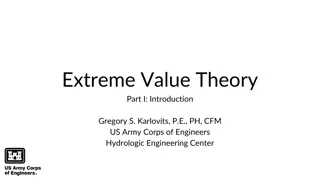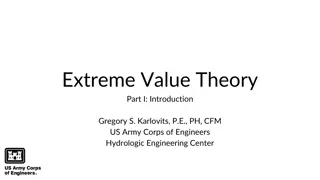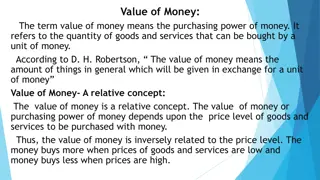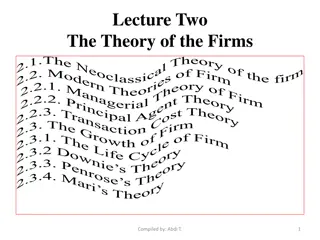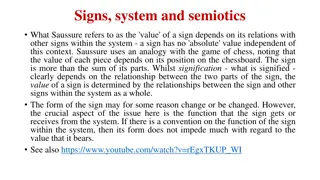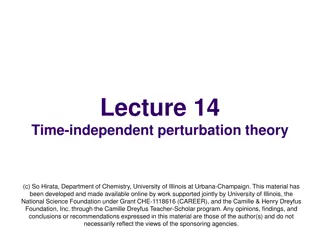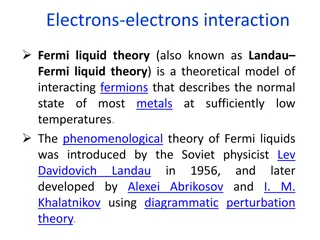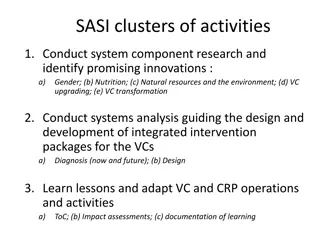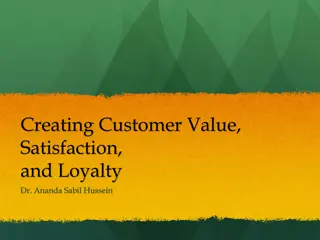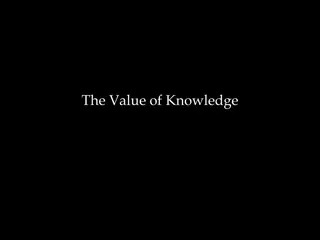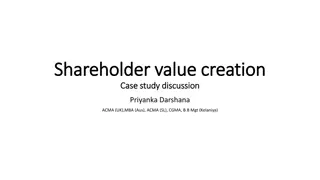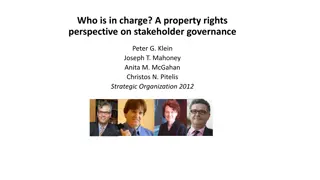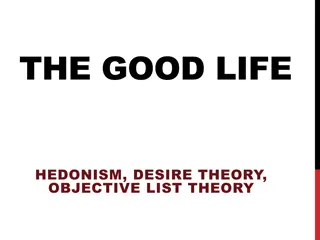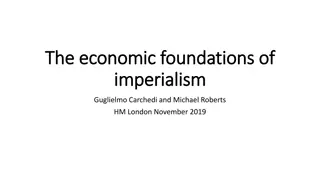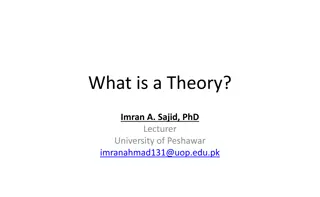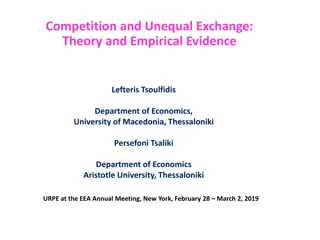ECC Social Value Reporting and Evaluation Framework
Essex County Council (ECC) has implemented a robust Social Value Reporting and Evaluation framework based on the Local Government Association's National TOMs method. This framework categorizes and assesses social value contributions in two parts - Value Score and Supporting Statement Score - to deri
3 views • 16 slides
Extreme Value Theory in Civil Engineering
Introduction to Extreme Value Theory by Gregory S. Karlovits and Emil Julius Gumbel. Exploring the importance of extreme values in civil engineering, Gumbel's EV questions, seeking models for extreme behavior, and lecture outlines on order statistics and extreme value theorems. The discussion includ
1 views • 48 slides
Extreme Value Theory in Civil Engineering
Introduction to Extreme Value Theory (EVT) in civil engineering focusing on the analysis of extremes such as shear strength, slope stability, and load factors. The theory, exemplified by Emil Julius Gumbel, questions the likelihood of individual observations falling outside expected distributions. E
12 views • 49 slides
Evolution of Mathematical Theories and Proof Systems
Development of mathematical theories such as model theory, proof theory, set theory, recursion theory, and computational complexity is discussed, starting from historical perspectives with Dedekind and Peano to Godel's theorems, recursion theory's golden age in the 1930s, and advancements in proof t
3 views • 29 slides
Psychological Theories of Criminality: Understanding the Roots
Psychological theories of criminality delve into the association between intelligence, personality, learning, and criminal behavior. Major theories include Psychodynamic Theory by Freud, Behavioral Theory by Bandura, and Cognitive Theory by Kohlberg. These theories explore how unconscious mental pro
1 views • 20 slides
The Value of Money and Standards
The value of money refers to its purchasing power, which is influenced by the price level of goods and services. Different standards, such as wholesale, retail, and labor, help measure the value of money. Money can have internal and external value, affecting domestic and foreign transactions. The Qu
0 views • 62 slides
Theory of Firms: Neoclassical vs. Modern Approaches
The theory of firms is explored through the Neoclassical and Modern perspectives. Neoclassical theory focuses on profit maximization, while Modern theory delves into managerial, principal-agent, and transaction cost theories. The discussion covers criticisms of Neoclassical theory and the essential
1 views • 79 slides
Theories of Causation in Psychological and Social Sciences
Overview of theories of causation categorized into psychological, social psychological, and sociological perspectives. Psychological theories focus on instinctive, biological, and psychological qualities of abusers, including Attachment Theory, Psychodynamic Theory, Social Learning Theory, and Situa
1 views • 15 slides
Signs, System, and Semiotics According to Saussure
Saussure's concept of sign value emphasizes the importance of relationships within a system, where a sign's meaning is not absolute but dependent on its interactions with other signs. He highlights the distinction between signification and value, showcasing how signs derive their value from the syst
1 views • 10 slides
Political Theory through a Contextual Approach
Exploring G.H. Sabine's perspective on political theory through a contextual approach, emphasizing the importance of historical context and societal influences. Sabine argues that while political theory evolves with its contemporary politics, it should be analyzed within its specific time and social
0 views • 9 slides
Evolution of Light Theory: From Wave Theory to Quantum Theory
At the turn of the century, the discovery of the photoelectric effect challenged the wave theory of light, leading to the development of the quantum theory by Max Planck and Albert Einstein. This new theory introduced the concept of discrete energy units known as quanta, bridging the gap between wav
2 views • 62 slides
Relevance and Limitations of Marx's Capital in Modern Social Theory
Exploring the ongoing relevance of Marx's Capital in contemporary social theory, Gary Herrigel from the Department of Political Science discusses its implications and theoretical considerations. Despite its foundational role, Marx's work also faces practical limitations, such as the challenge of tra
4 views • 14 slides
Enhancing Social Value through Strategic Procurement
STAR Procurement, the shared service for multiple councils, emphasizes the importance of Social Value in procurement practices. The Social Value Portal serves as a management tool to measure and demonstrate the benefits of Social Value commitments. Bidders are required to provide quantitative and qu
2 views • 14 slides
Dp-branes, NS5-branes, U-duality, and M-Theory Overview
Overview of Dp-branes, NS5-branes, and U-duality derived from nonabelian (2,0) theory with Lie 3-algebra. Introduction to M-theory, including M2-branes and M5-branes in the strong coupling limit. Discussion on BLG theory, Lorentzian Lie 3-algebra, and the ABJM theory for M2-branes.
3 views • 32 slides
Integrated Value Creation in Corporate Finance
Explore the concept of integrated value creation in corporate finance, emphasizing the importance of managing for long-term value while incorporating social and environmental goals. Learn about responsible management practices that focus on creating net present value (NPV) through a balance of finan
0 views • 38 slides
Time-Independent Perturbation Theory in Quantum Mechanics
Perturbation theory is a powerful tool in solving complex physical and mathematical problems approximately by adjusting solutions from a related problem with known solutions. This theory allows for more accurate approximate solutions by treating the difference as a small perturbation. An example inv
0 views • 19 slides
Ethical Theories: Divine Command vs. Virtue Theory Explained
Divine Command Theory asserts that morality is derived from God's commands, contrasting with Virtue Theory which focuses on developing moral virtues to achieve human flourishing and excellence. Divine Command Theory relies on religious texts, while Virtue Theory emphasizes the cultivation of virtues
0 views • 24 slides
Fermi Liquid Theory in Interacting Fermion Systems
Fermi liquid theory, also known as Landau-Fermi liquid theory, is a theoretical model that describes the normal state of metals at low temperatures. Introduced by Landau and further developed by Abrikosov and Khalatnikov, this theory explains the similarities and differences between interacting ferm
0 views • 23 slides
Enhancing Pig Value Chains Through Innovation and Intervention
Conduct research to identify innovative solutions in gender, nutrition, environmental sustainability, and value chain upgrading/transformation. Utilize systems analysis to design integrated intervention packages for pig value chains. Learn from outcomes to adapt operations and activities, focusing o
1 views • 10 slides
Maximizing Customer Value, Satisfaction & Loyalty in Business
Explore the essence of customer value, satisfaction, and loyalty in business success through Dr. Ananda Sabil Hussein's insightful perspective. Learn about customer perceived value, determinants of value, steps in value analysis, loyalty definitions, satisfaction measurements, and the significance o
0 views • 18 slides
Computational Learning Theory: An Overview
Computational Learning Theory explores inductive learning algorithms that generate hypotheses from training sets, emphasizing the uncertainty of generalization. The theory introduces probabilities to measure correctness and certainty, addressing challenges in learning hidden concepts. Through exampl
0 views • 43 slides
Automata Theory and Theory of Computation Overview
This course overview covers concepts in automata theory and theory of computation, including formal language classes, grammars, recognizers, theorems in automata theory, decidability, and intractability of computational problems. The Chomsky hierarchy, interplay between computing components, modern-
1 views • 42 slides
The Value of Knowledge: A Philosophical Exploration
Exploring the value of knowledge through the lens of Plato's Meno Problem, this text delves into why knowledge is considered more valuable than mere true belief. It discusses Plato's solution to the problem, the secondary and tertiary value problems, and constraints on solutions and strategies in un
1 views • 22 slides
How to Calculate Present Value & Future Value Using Microsoft Excel
Learn how to calculate present value and future value using Microsoft Excel functions such as PV and FV. Understand the syntax, arguments, and examples for determining the value of single amounts, annuities, and lump sums. Step-by-step instructions provided for efficient financial calculations.
1 views • 14 slides
Theories of Interest in Microeconomics II
Explore various theories of interest in economics, including the Classical Theory, Liquidity Preference Theory by Keynes, Productivity Theory, Abstinence Theory, Time-Preference Theory, Fisher's Time Preference Theory, and the Loanable Fund Theory. These theories offer different perspectives on the
2 views • 6 slides
The Evolution of Atomic Theory
Delve into the historical journey of atomic theory starting from Democritus and Aristotle's views to modern advancements proving some aspects of Dalton's theory incorrect. Learn about key laws and theories such as the Particle Theory of Matter, Dalton's Atomic Theory, and JJ Thomson's discoveries, s
1 views • 30 slides
Maximizing Shareholder Value Creation Through Strategic Business Practices
Explore the concept of shareholder value creation, the importance of generating revenues exceeding economic costs, and meeting shareholders' expectations. Learn about Economic Value Added (EVA), key value drivers, aligning strategy with value creation, and essential factors for overall business succ
0 views • 11 slides
Rethinking Firm Governance Through Property Rights and Stakeholder Theory
Challenging the traditional shareholder-centric view, this study explores how property rights theory and stakeholder theory can offer a more comprehensive perspective on firm governance. It delves into the complexities of value creation, contractual relationships, and diverse stakeholder interests,
0 views • 10 slides
The Good Life: Hedonism, Desire Theory, and Objective List Theory
Delve into the concepts of Hedonism, Desire Theory, and Objective List Theory to understand what constitutes a good life and the pursuit of well-being. Explore different value theories, the debate between subjective and objective values, and the philosophical perspectives on happiness and pleasure.
1 views • 60 slides
Economic Foundations of Imperialism: Exploitation and Value Transfer
Imperialism primarily functions as an economic mechanism for exploiting value rather than seeking political dominance. The transfer of value occurs through mechanisms like unequal exchange, global value chain flows, and capital flows, leading to the long-term appropriation of value by imperialist na
0 views • 28 slides
Macromechanical Analysis of Lamina and Tsai-Hill Failure Theory Overview
The Tsai-Hill failure theory is based on the strengths of a unidirectional lamina, incorporating longitudinal and transverse tensile and compressive strengths, as well as in-plane shear strength. This theory, derived from the distortion energy theory, provides criteria for determining lamina failure
0 views • 15 slides
Theories of Personality: Type Theory, Trait Theory, Psychoanalytic Theory
Personality theories such as Type Theory, Trait Theory, and Psychoanalytic Theory classify personality based on various factors like body build, introversion/extroversion, enduring characteristics, and unconscious forces influencing behavior.
0 views • 13 slides
Theory: Nets to Rationalize, Explain, Master
The concept of theory is explored through the works of Imran A. Sajid, Ph.D., and definitions by various scholars. Essential elements of a theory, including concepts, facts, hypotheses, and principles, are dissected along with the role of concepts in theory-building, particularly in social work prac
0 views • 47 slides
Econometric Theory for Auctions and Value Distributions
Delve into the world of auction theory, identification, and estimation of value distributions in econometrics. Explore non-parametric identification and estimation techniques in first-price auctions. Gain insights into algorithmic game theory and econometrics with a focus on structural estimation in
0 views • 26 slides
Theory of Unequal Exchange and Transfers of Value
Theory and empirical evidence on unequal exchange and transfers of value in international trade according to Emmanuel's analysis. Discusses causes of transfers of value and conditions for ruling out unequal exchange. Utilizes labor values and prices of production to understand the dynamics of unequa
0 views • 18 slides
Bayesian Philosophy of Science and Confirmation Theory
This content delves into the Bayesian Philosophy of Science, focusing on the Bayesian Confirmation Theory (BCT). It discusses conditions of adequacy and representation theorems, showing how Bayesian Confirmation Theory can be applied by historians of science and scientists. The theory addresses para
0 views • 26 slides
Ownership Structure Theory in Firm Management
Delve into the groundbreaking 1976 article by Jensen and Meckling on the Theory of the Firm, exploring the nexus of managerial behavior, agency costs, and ownership structure. Uncover insights on why managers make decisions that may reduce firm value, the role of common stock in capital sourcing, an
0 views • 24 slides
Theory Construction in the Social Sciences: Understanding Components and Types
Explore the key components of theory construction in the social sciences, including the definition of theory, different types of theories, components of a theory, and the distinction between Big T and small t theories. Discover what theory is not and gain insights into the process of theory construc
0 views • 38 slides
Enhancing Product Value Through Value-Added Processes
Learn about value-added products in agriculture, such as flour, corn syrup, cracked corn feed, and ethanol. Discover how products like wheat and corn are transformed into higher-value goods through processing, adding value to the final product. Value-added processes involve changing the physical sta
0 views • 8 slides
Value Creation Perspectives: Resource-Based vs. Property Rights Theory
Explore the dynamics of value creation in the context of oil field unitization, comparing the resource-based theory with property rights theory. The paper delves into the significant role of property rights in internalizing externalities and overcoming common-pool resource challenges, using a case s
1 views • 12 slides

